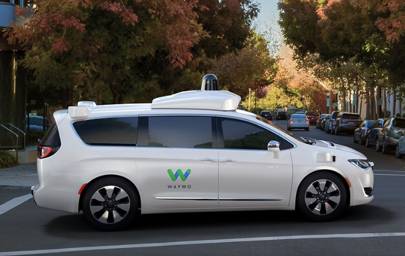

Waymo
Your WIRED daily briefing. Today, Waymo’s autonomous vehicles have covered millions more miles than its rivals’, Cambridge Analytica bought data from Experian and Axicom, Softbank has sold off Arm China and more.
Get WIRED’s daily briefing in your inbox. Sign up here
Advertisement
1. Waymo’s self-driving cars have travelled 7 million miles
Alphabet’s autonomous vehicle subsidiary, Waymo, has revealed that by the end of this week its self-driving cars will have racked up a total of 7 million miles (11.2 million kilometres) on the road (Ars Technica). This puts the company far ahead of its rivals in terms of practical testing, although most of those miles have been covered in relatively unchallenging suburban areas. Waymo plans to set up an autonomous taxi service in the US city of Phoenix, Arizona, later this year.
2. Nix: Cambridge Analytica bought data from Experian, Axicom
Under questioning by MPs, former Cambridge Analytica CEO Alexander Nix admitted that the company’s extensive cache of data on US voters also included “millions of data points on American individuals from very large reputable data aggregators and data vendors such as Acxiom, Experian, Infogroup” (TechCrunch). Nix downplayed the significance of data models based on information scraped from Facebook profiles and his own knowledge of what client data would have been given to CA partner firm Aggregate IQ. He also showed discomfort when questioned about documents indicating that the company had considered carrying out DDoS (distributed denial of service) attacks in order to influence elections.
3. Softbank sells off Arm China
Two years after acquiring British chip designer Arm Holdings along with all its subsidiaries, Japanese tech conglomerate Softbank has sold a 51 per cent share in the Arm China subsidiary to a group of Chinese investors (The Register). The purchase price of $775.2m seems a little low, given that Softbank paid $31 billion for Arm and that Arm China accounts for some 20 per cent of Arm revenues. The move is significant for China’s tech industry as a whole, as it’s likely to speed up the development cycle of home-grown processors at a time when US trade sanctions have made importing CPU tech a challenge for the country’s hardware firms.
4. The games industry doesn’t know how to cure its lootbox addiction
Lootboxes, bundles of randomly selected virtual goodies, often purchased with real money, have quickly become a common sight in video games (WIRED). From free-to-install mobile titles to premium Xbox and PlayStation blockbusters, they’re immensely popular, contributing to a global micro-transactions business worth billions of dollars a year. But to some players, they can become an unhealthy obsession. “You’d tell yourself, ‘Okay, you can spend €200 from your paycheck’,” says Kevin, a 28-year-old self-declared former lootbox “addict” who lives in Germany. “Once that was gone, you’d say ‘Okay, €300 is fine,’ and so on and so forth. Every time I’d check my bank account my heart would drop and I’d be mad at myself.”
Advertisement
5. Rhythm-based, three-dimensional Tetris is coming to PlayStation VR
Tetsuya Mizuguchi’s Enhance Games – the team behind hits Rez Infinite and Lumines – is working on The Tetris Effect, a new, rhythm-based take on the Russian shape-spinning classic that’s coming to PS4 and PSVR this autumn (The Verge). The 30-plus stage game looks stunning, with rich, spacey visuals and electronic music that’ll tie into the gameplay experience. Writing on Sony’s PlayStation Blog, Mizuguchi says that the game is named after and designed to create a scientifically documented side-effect of playing a great deal of Tetris: the phenomenon of seeing falling blocks in your mind’s eye as you go about your day.
Popular on WIRED
How WeWork became the most hyped startup in the world
WeWork launched its first shared workspace in New York in 2010, leasing office space to startups and small businesses on a monthly basis. Since then, the company has grown at a rapid clip. It now has 253 locations in 22 countries and manages more than 1.3 million square metres of office space. London is the company’s second-largest market after New York; WeWork operates 23 locations across the city and has plans for ten more, including a colossal 26,000-square-metre space on the South Bank.
Music, intelligent design and culture at Sónar+D
Embracing a broad view of creativity, Sónar+D is inviting artists, creative technologists, musicians, filmmakers, scientists, entrepreneurs, makers and hackers together from over 100 countries to mix and share ideas with one another.
Advertisement
Podcast 371: The problem with Solo: A Star Wars Story
Listen now, subscribe via RSS or add to iTunes.
Get WIRED Awake sent straight to your inbox every weekday morning by 8am. Click here to sign up to the WIRED Awake newsletter.
Follow WIRED on Facebook, Instagram, Twitter, LinkedIn and YouTube.
